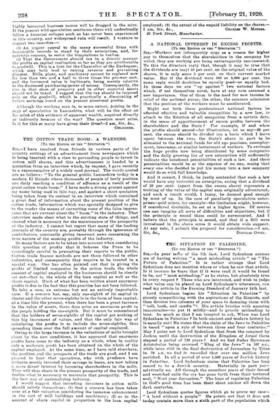A NATIONAL INTEREST IN EXCESS PROFITS. (To THE EDITOR or
THE " SPECTATOR.") SIR,—Workers not infrequently urge as a reason for higher pay to themselves that the shareholders in the company for which they are working are being extravagantly remunerated. To this the directors reply that, though it may be true that the dividends are (say) 50 per cent. on the original value of the shares, it is only some 5 per cent. on their current market value. But if the dividend were 500 or 5,000 per cent. the same reply would doubtless be equally good—or equally bad. In these days we are " up against " two national factors which. if not themselves novel, have at any rate assumed a new importance. One of them is the need for new income in relief of the national purse; the other, the common admission that the position of the workers must be ameliorated.
Might not both these predominant national factors be afforded effective and valuable recognition by a new law, to attach to the flotation of all companies from a certain date, in the sense of apportionment of excess profits between the shareholders and the "State ? For example, if and when the profits should exceed—for illustration, let us say-20 per cent. the excess (should be divided (on a basis which I leave open) between the two; the State's share in part to be allocated to the national funds for old age pensions, unemploy- ment, insurance, or similar betterment of workers. To envisage the huge profits now being distributed by some companies and the daily growing list of new enterprises will sufficiently indicate the beneficent potentialities of such a law. And these potentialities would be at the expense of no one, seeing that every one who decided to put his money into a new company would do so with full knowledge.
And it cannot, I think, be justly contended that such a law would have any restraint on enterprise, seeing that a dividend of 20 per cent. (apart from the excess share) represents a trebling of the value of the capital sum originally adventured; and such a result would, I fancy, be deemed good enough by most of us. In the case of peculiarly speculative enter- prises—gold mines, for example—the limitation might, however, if considered desirable, be set at a higher figure. Of course one can imagine all sorts of difficulties and objections, but if the principle is sound these could be surmounted. And I believe that the principle is sound. and that if a Bill were introduced in the above sense it would obtain wide support: At any rate, I submit the proposal for consideration.—I am,


































 Previous page
Previous page